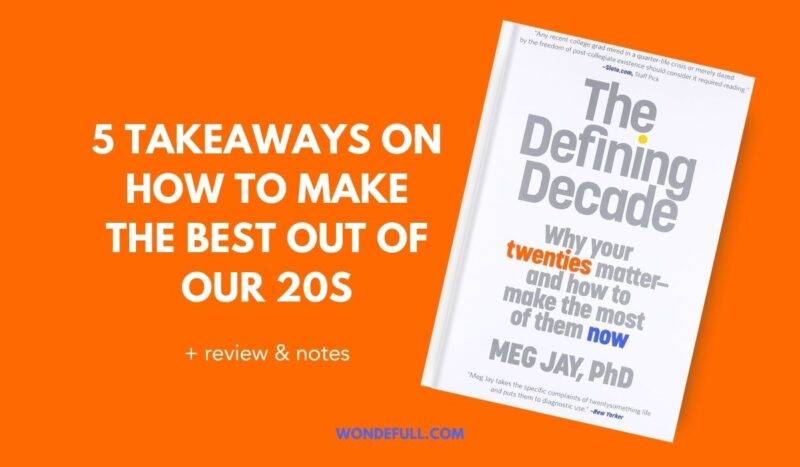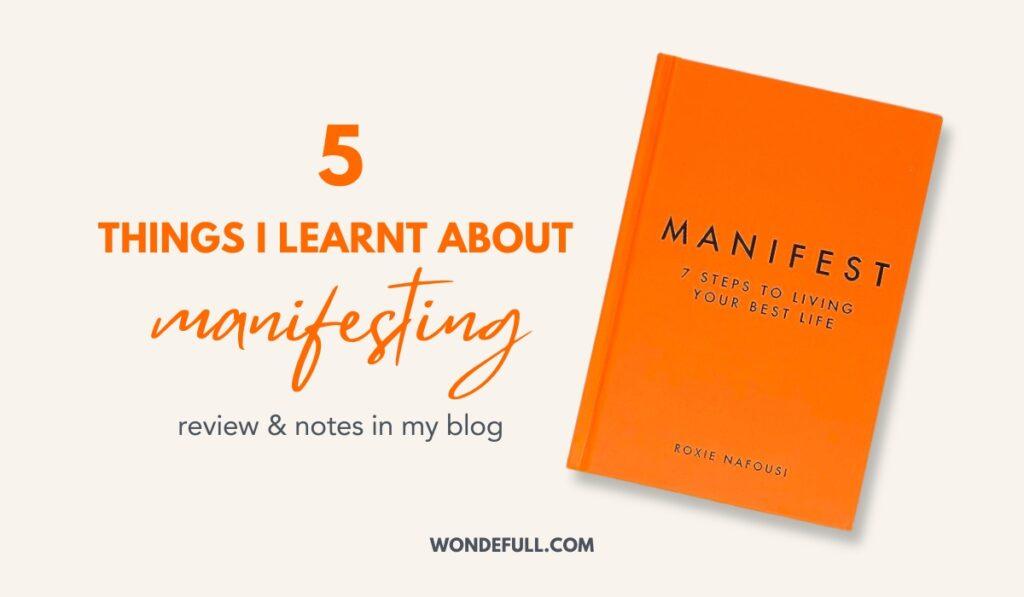What is Unique About This Book
‘The Defining Decade’ provides a guide for navigating the crucial decisions of your 20s, featuring real-life examples and backed by findings from multiple studies. The book is written by Meg Jay, Ph.D., a clinical psychologist and speaker renowned for her work on young adulthood and development.
How I Discovered It
My friends—Xiao Tong and Azim—introduced me to this book in November 2023.
Who Would I Recommend This Book
🟢You are in your 20s to early 30s: Although the book states that it is for those in their 20s, I think individuals in their early 30s will benefit by reading it.
🟢You want a better career and relationships: This book targets those with mainstream or traditional goals, such as having a successful career and building a family. Some chapters may not resonate with you if these are not your priorities.
🟢You are keen on personal development and self-love topics
🚫You don’t want to change how you live your life: It’s important to note that this is a self-help book, and embracing change is a crucial component. If you’re not open to change, this might not be the right fit for you.
🚫You face mental health issues: If you are having mental health issues, approaching this book may be challenging as the advice given may add stress if not viewed objectively.
My Review of The Defining Decade
A bit of context about me so that you know what kind of reader I am. As an INTJ, I’m inherently curious and open-minded to learn about anything that can help me improve myself with a discerning mind. I objectively approach information and retain only what proves beneficial, valuing logical knowledge backed by scientific findings.
Despite the potentially depressing claim that one’s 20s are the defining decade, which might induce anxiety in some, reading ‘The Defining Decade’ calmed me down. It made me realise the importance of time and energy in my 20s. Before reading the book, I wanted to do many things. I wanted to have fun and accomplish big achievements. I felt like I was running out of time.
Notably, the advice is based on the assumption that readers have traditional goals such as having a purposeful career and marriage and kids. I fall under this category, so this book resonates well with me. It has helped me recognise the need to act on my true desires and stop wasting my time and energy on things that don’t serve me well in the long term. With this revelation, I am more intentional than ever, and I’ll share how I’m navigating my 20s at the end of this article.
If you want to buy this book, you are most welcome to use my link. If it’s not for you, feel free to check out other books in book notes!

5 Key Lessons from This Book
#1 We need identity capital
We are born not all at once, but by bits.
– Mary Antin
Throughout the past two years of discovering myself, I realise the same thing as what the book shared, “who we are” does not come clear to us through an epiphany. It is revealed gradually after doing things long and well enough, leading to knowledge, skills, and experiences gained. These are called identity capital, such as degrees, jobs, and businesses which can go on resumes, or something more personal like how we carry ourselves, our upbringing, and how we solve problems.
I love Meg’s analogy: Identity capital is what we bring to the adult marketplace — the currency we use to metaphorically purchase jobs, relationships, and other things we want.
It is true that we should be wild and fun when we are young – explore the world and gain different experiences. But hopping between things and delaying crucial decisions just for the sake of it is not it. We have to start making decisions and getting going to avoid the pain of realisation that life will not add up after wasting our 20s on things that do not help us get closer to our dreams. The only way to figure out what to do is to do something.
#2 Weak ties get us new opportunities.
For those who do not know, weak ties are the people we have met or are connected to somehow but do not currently know well. It can be our ex-colleagues, ex-classmates, neighbours we only say hi to, or acquaintances we met at a gathering years ago.
I first came across this information when I read the article “Which Connections Really Help You Find a Job?” by Harvard Business Review. It revealed that weak ties are most helpful for finding new jobs. In “The Defining Decade”, Meg Jay shared her story about how she got to publish her book by connecting with an editor whose box of books got wrongly delivered to her. By the time Meg wrote the book, she had not met the editor or the publisher who ultimately acquired her book. I also benefited from weak ties as I got my two full-time jobs through the recommendations of an ex-colleague and ex-job interviewer.
Due to the non-overlapping social circles with weak times, they are like bridges we cannot see all the way across, so there will be surprises and new opportunities they might lead us to. As new things come from outside our inner circle, we shall expand our networking intentionally.
Benefiting from ‘helper’s high’ and the Ben Franklin effect, where people like someone more after doing a favour for them, reaching out doesn’t have to be daunting. Making ourselves interesting and being respectful and cautious in our requests are key. Remember to contribute to the community as you accumulate knowledge and experiences.
#3 Claim what we want proudly.
It’s easy to say that we don’t want this and that, but a braver form of self-definition dares to be affirmative. Nowadays, we are ashamed to say out loud what we want as we don’t want to be called desperate and face the fear of rejection in public.
Claiming a career or relationship is just the beginning. And there’s still a lot more to know and to do. Without the claim as the start, how do we reach the end goal? Additionally, goals are also the building blocks of adult personality. Who we are in our thirties and beyond is shaped out of the goals we are setting for ourselves today.
I have been putting aside my want for a long-term relationship and tossing the notion of having kids a decade into the future as I thought they were out of my control. I decided to focus on my career instead because it rarely let me down. However, as the book says, doing something later is not necessarily the same as doing something better. Data has also shown that even as the average age of marriage rises, the divorce rate holds steady at about 40 percent.
Then, I realised that putting a halt to my pursuit of a relationship was not benefiting me. I missed the opportunity to date intentionally, practice being a suitable date and partner, and learn how to build and maintain healthy relationships. Even though I may not meet ‘The One’ until the end of my 20s, I will be more prepared for that reunion when it finally happens.
#4 Picking a partner and family is not romantic.
Many of us don’t understand the far-reaching consequences of picking a partner. Therefore, while selecting a partner, we were not as intentional as how we choose our career and friends.
Even for those already in relationships, many couples move in together without the intention of evaluating their compatibility for marriage, leading to eventual breakups. The initial romantic feelings in a relationship are insufficient to weather the challenges of marriage, which involve considerations such as family dynamics, finances, children, and commitments.
Now that I recognise picking my partner is one of the most important life decisions I could ever make, I will be more intentional on who I go out on a date moving forward. Looking back at the past flings, I am no longer tempted to revisit those.
#5 Confidence is built from the outside.
Inaction breeds fear and doubt. Action breeds confidence and courage,. If you want to conquer fear, do not sit home and think about it. Go out and get busy
– Dale Carnegie
I agreed with Meg’s point that confidence moves from the outside in. When we attained mastery experiences, we gained self-confidence. While accumulating working experiences in the past four years, my self-confidence has improved by leaps and bounds.
Another key skill that twentysomethings have to master is learning how to self-soothe when we are anxious and stressed. Despite maintaining a poker face, I was a very emotional person, and these emotional turmoils would ruin my day, keeping me stuck in my comfort zone. That’s when I began practising meditation, journaling, reading self-help books, and seeing a therapist. Through these efforts, I am glad that now things that used to alarm and upset me two years ago no longer trigger me.
How am I living my 20s
Having recently turned 27 on October 23, 2023, I have three more years to savor my 20s. After exploring various career pathways, I’ve set my sights on product management and entrepreneurship. I am committed to accumulating mastery experiences, knowledge, and skills to establish myself as an expert in the tech field.
In the realm of relationships, I’ve chosen to date intentionally, with friends holding me accountable to stay focused on my goal of finding a suitable long-term partner. I am committed to effectively communicating my wants and boundaries, refusing to compromise my standards for love.
Beyond career and relationships, I will stay open-minded and curious to learn new knowledge and skills while challenging myself to explore different ways of doing things. Proud of my growth mindset and perseverance, I am determined to uphold these virtues.
From previously being too anxious about the future to embracing a temporary YOLO phase, I oscillated across the spectrum until I gained insights from books like ‘The Defining Decade,’ ‘Quiet,’ and ‘The Midnight Library.’ Now, I aim to balance being present and planning for my future. I appreciate my old self for working hard to become who I am today, and I cannot wait to see how awesome I will become in the coming years.
This book has definitely changed my perspectives of life, and subsequently shifted my life priorities. If you have read this book, please share with us what you think about it below!
Happy reading for those who are interested to read ‘The Defining Decade.’
Like this book review and notes? Share it on Pinterest – thank you!





